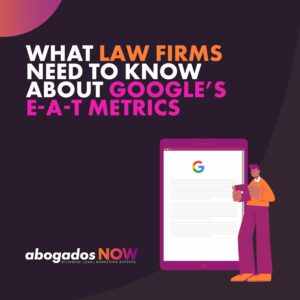Google loves to update its algorithms. If you own a website, you probably dread these updates. Depending on the target of the update, you could find that an update causes your ranking to plummet, or you may suddenly not rank for keywords that have been successful in the past. But what do you do about it?
One of the most important things to know about Google right now is that their updates are likely not having as much of an impact on your website as their quality guidelines. Law firms are some of the businesses that have felt the impact of updated quality guidelines the most. That’s because law firms offer advice that actively affects people’s lives. Google calls this a YMYL – your money or your life – website.
Since 2014, Google has been implementing changes to its quality guidelines, and a lot of those changes focus on making sure that websites are credible and trustworthy.
Enter the E-A-T acronym that many law firms love to hate, and hate to love.
What is E-A-T?
E-A-T stands for expertise, authoritativeness, and trustworthiness. When Google updated its quality guidelines to the E-A-T model, a lot of law firms saw dramatic changes in their analytics. In most cases, that’s because the law firm’s website didn’t meet Google’s E-A-T standards as they were updated in 2018 and 2019. With this update, not only is it a problem to not meet the guidelines, but it is a huge problem to not update your website to meet the guidelines.
In short – don’t ignore the E-A-T.
Let’s dive deeper into what E-A-T is and why it is important for your law firm’s website.
Expertise
Who is the main content creator for your website? Is it a lawyer, paralegal, or another legal professional? Is it a professional content writer? Or is it a freelancer you hired from overseas?
For many years, the main content creator wasn’t as important to Google as traditional SEO metrics. Now, however, credentials matter! Google wants to know who is writing your content and what credentials they have. For a legal website, that means the person writing your content should have some education, training, or experience in the legal industry. Without expertise (i.e. credentials), to support what is being written about, your site could suffer or be labeled as poor quality by Google.
That spells disaster no matter how you look at it.
Authority
Google defines authoritativeness as “generally recognized authority”. That means that people know who you are, know your position in your industry, and accept you as a good source of information. Lawyers can easily meet authoritativeness guidelines by having clear information about who they are and what they do listed on their website.
Content posted by a lawyer can then be linked back to those credentials or outside sources to show that you know what you are talking about and have the goods to back it up. Essentially, you need to prove to your audience (ahem, Google) that you have some authority to be providing legal advice or representation.
Trustworthiness
Now that your readers and Google know who you are and why it’s okay that you are giving legal advice, your next step is making sure your website is trustworthy. This part is a bit tricky. Google is looking for references and outside links to your website by other reputable sources. Note – we said reputable. When it comes to building trustworthiness, quality is prized over quantity. That means 100 low-quality backlinks will not help your site. However, 10 high-quality backlinks will.
You can help build your trustworthiness by optimizing your website, and by seeking out quality backlinks and opportunities to offer your expertise to other websites via interviews, forums, comments, answers, etc.
Optimizing Your Law Firm Website for E-A-T
As you can see, E-A-T is an incredibly important part of ranking well and getting your website in front of users, and hopefully clients. If you haven’t already taken the time to optimize your website to meet E-A-T guidelines, there’s no time like the present. Here are our recommendations for how to get started:
- Make sure every page on your site has a purpose. If a page no longer has a purpose, redirect it or remove it.
- Make sure every page has expertise to back up the content. Have a reputable (real-life) person write your content. Have a lawyer or paralegal review it for accuracy. List the author and/or reviewer on each page.
- Every page that offers advice or attempts to convert a user should be optimized for the highest E-A-T quality possible. Google sees these pages as YMYL pages.
Putting it All Together
Google’s E-A-T guidelines are designed to make sure that the user has the best experience possible on your website. Your law firm wants to convert users into clients, and the best way to do that is to show them why you are the best choice. Using E-A-T guidelines can help you do just that. With a little time and creativity, you can propel your website to the top of Google rankings and get the attention of the clients that need you most.





